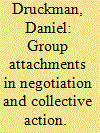| Srl | Item |
| 1 |
ID:
087570


|
|
|
|
|
| Publication |
2009.
|
| Summary/Abstract |
Increasingly, scholars have taken note of the tendency for women to conceptualize issues such as security, peace, war, and the use of military force in different ways than their male counterparts. These divergent conceptualizations in turn affect the way women interact with the world around them and make decisions. Moreover, research across a variety of fields suggests that providing women a greater voice in international negotiations may bring a fresh outlook to dispute resolution. Using experimental data collected by the GlobalEd Project, this article provides substantial support for hypotheses positing that females generate significantly different processes and outcomes in a negotiation context. These findings occur both in terms of female negotiation behavior and the impact of females as negotiation facilitators/mediators.
|
|
|
|
|
|
|
|
|
|
|
|
|
|
|
|
| 2 |
ID:
075745


|
|
|
|
|
| Publication |
2006.
|
| Summary/Abstract |
The impact of group attachments on negotiating behavior is a theme (or variable) that runs through many articles published in International Negotiation. It is also a popular topic for research on groups reported in other outlets. This literature set in motion the analytical probe discussed in this article. Focusing attention primarily on ingroup-favoring biases, four questions are asked: What is the phenomenon? Why does it occur? How can it be reduced? Where is it manifest in a larger policy context within which negotiations take place? Highlighted in this essay are the prevalence of the bias, the variety of plausible explanations for its occurrence, the distinction between patriotic and nationalistic group attachments, and the connections between group loyalty, policy making, and collective action. The insights achieved also reveal a number of areas for further research. This topic is one example of the many research accomplishments that herald the birth and maturity of a field of study and practice. In this special issue, we take pause to document these accomplishments as we look forward to another decade of progress
|
|
|
|
|
|
|
|
|
|
|
|
|
|
|
|